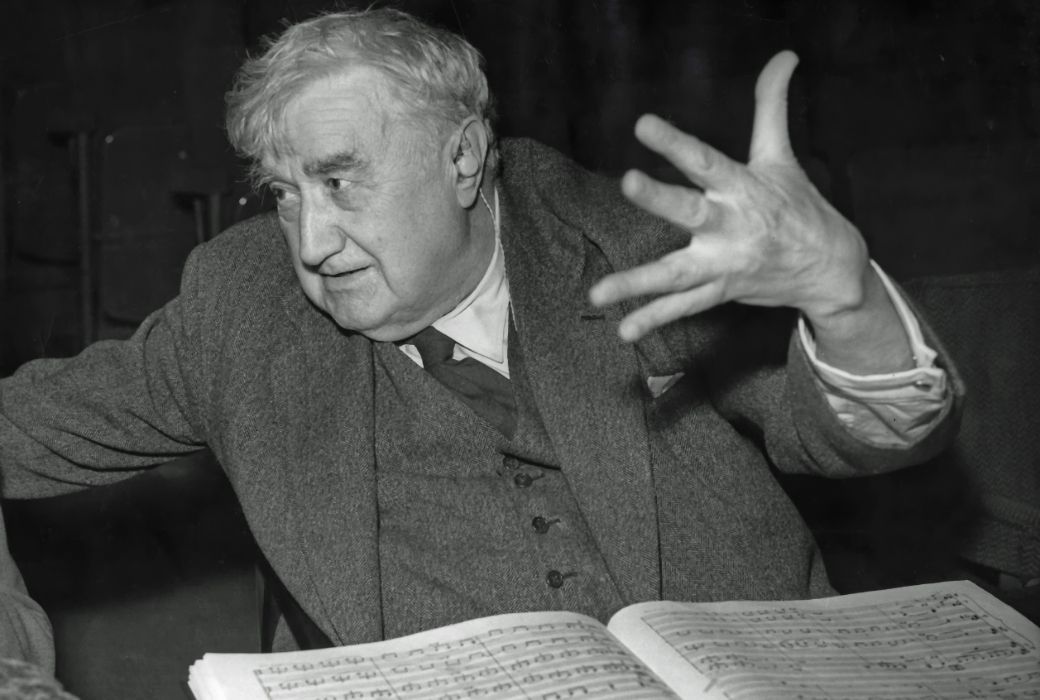The crude consensus about The Pilgrim's Progress by Ralph Vaughan Williams runs thus: it took nearly 50 years to write, so sounded out of date when it appeared; he had already used the best bits in other works; no-one liked it when it opened; it’s not really an opera anyway, and unsuitable for the stage.

The premiere was on 26th April 1951, but the starting point of its gestation was 1906, when Vaughan Williams composed incidental music for an amateur stage presentation at Reigate Priory, which successfully transferred to London. He also suggested the inclusion of the song “He Who Would Valiant Be”, whose music was a folk song collected by Vaughan Williams in 1904 in Sussex. It was sung to him on one of his song collecting field trips by Mrs Harriet Verrall of Monk’s Gate, Horsham. She called the song “Our Captain calls”, but Vaughan Williams called the tune “Monk’s Gate” when arranging it for his English Hymnal as the tune for Bunyan’s text (as bowdlerized by Percy Dearmer from Bunyan’s “Who would true valour see”). Vaughan Williams was an atheist but had served as a church organist and knew the difference between a trained choir and the congregation; the hymnal was for the latter, so he pitched the tunes low.
Folksong collecting and English Hymnody are fundamental to the emergence of Vaughan Williams’ style and early success. The Third Mode Melody of Thomas Tallis and Dives and Lazarus were both adapted for the Hymnal, and transformed for later masterpieces for string orchestra. Vaughan Williams recalled Arnold Bax teasing him: “You know VW, all your best sellers are not your own.” The Fantasia on a Theme by Thomas Tallis seems also to have been associated with Bunyan, as he was to use it for a radio version of the book, as we shall see.
This use of folk music for a hymnal was controversial and the Archbishop of Canterbury said he hoped his clergy would not use the book, which one cynic felt explained its success. The sound of The Pilgrim's Progress has roots deep in the English countryside and the Anglican Church. But Scotland has the first and final notes. The psalm tune York was found in the Scottish Psalter and opens and closes both the 1906 incidental music and the final opera, where it opens the Prologue, with John Bunyan in prison putting the last words to his book.
Bunyan’s work was a phenomenon in the late 17th century and has been ever since; there have been 1,300 editions and translations into over 100 languages. The author was from the other end of the social scale from that of the well-connected and well-off Vaughan Williams: he was a tinker by trade and preacher by vocation, his opinions forged by serving in Cromwell’s army, that melting pot of radical social and religious discussion. For unlicensed (i.e. nonconformist) preaching he spent twelve years in Bedford prison, and when told he could go if he would stop preaching he informed his gaolers: “If you release me today, I shall preach tomorrow.” He wrote several books in prison, including The Pilgrim's Progress, published in 1678. Its colloquial style, more demotic than divine, saw it read by many of his own class. Vaughan Williams was not the only soldier to have a copy in the trenches, for its allegory of a pilgrim called Christian, asking “What must I do to be saved?” and confronting a series of adversities to reach his goal, explores something central to the human condition.
The composer’s next step in turning it into an opera came in 1921-22 with his “Pastoral Episode” The Shepherds of the Delectable Mountains, which eventually became Act 4, Scene 2 of the opera. The opening exchanges in this version survived largely intact, but the arrival of Pilgrim at his final goal varies each time it was written. For some, this 1922 version was not surpassed in later rewrites.
Vaughan Williams’s engagement with Bunyan continued with a 1940 motet for mixed chorus on Mr. Valiant-for-Truth’s speech. It was written in memoriam for a musical friend, Dorothy Longman, and ends with Bunyan’s use of Corinthians,“‘Death, where is thy sting?’ And as he went down deeper, he said, ‘Grave where is thy victory?’ So he passed over, and all the trumpets sounded for him on the other side.”
The next public encounter with Bunyan’s book was in 1942, when the BBC commissioned incidental music for a radio dramatisation with John Gilegud as Christian. Christopher Palmer arranged a version for a recording, which necessarily omitted most of the dialogue to produce a sort of digestible RVW’s Bunyan he called The Pilgrim's Progress – A Bunyan Sequence. The Prologue again begins with the tune York, but there then follows extensive use of the Tallis Fantasia – and not only on the strings.
Since 1925, Vaughan Williams had been at work intermittently on the full-scale opera and finished Acts 1 and 2 over the next decade. Yet he felt that it would not reach the stage, as his other operas of the period (Hugh the Drover, Sir John in Love, Riders to the Sea) for all their qualities had not enjoyed sustained success. But if he abandoned the project, he did not discard all the music, allocating some of its themes to his Fifth Symphony (1943). Music for the sublime third movement Romanza of the symphony was imported from Act 1 Scene 2 of the opera (which of course still languished incomplete). Pilgrim (as Vaughan Williams renamed Christian to be more inclusive) begins his journey and arrives at The House Beautiful, greeted by the Three Shining Ones – hence the radiant quality of the score here.
Vaughan Williams resumed work on his opera in 1943, finishing in 1948. In the opera, which the composer preferred to call a “morality”, the libretto respects the structure of the book in depicting a spiritual quest with moments of adversity but also of succour. Episodes and characters encountered in the book are heavily pruned, and some people are added. Thus, Pilgrim loses his travelling companions Faithful and Hopeful, but Mr By-Ends gains a wife, and Judas Iscariot and Pontius Pilate turn up to swell the ranks of malefactors in Vanity Fair (Act 3 Scene 1), the liveliest part of the whole score, leading to the trial and condemnation of Pilgrim.
It was first performed by The Royal Opera in 1951, and was largely dismissed by the critics as too reverential, lacking in real drama and poorly staged. The music was admired, but regarded more as oratorio, thus for concert hall or cathedral. Vaughan Williams resisted this, insisting it was a work for the stage, but confessed it “is more of a ceremony really than a drama”.
Covent Garden dropped the opera from its repertoire in 1952. A student production at Cambridge in 1954 was admired by the composer, notably for the performance of John Noble as Pilgrim. The North American premiere was in 1969, at Brigham Young University. In the composer’s centenary year of 1972, the work was staged at his old school, Charterhouse, and in 1992 at the Royal Northern College of Music. Three semi-staged performances were conducted by Richard Hickox between 1997 and 2008, and a full staging was mounted by English National Opera in November 2012. Conductor Martyn Brabbins wrote, as he prepared for that 2012 production:
“I’ve lived with the score for several weeks, and I believe I am in the company of a masterpiece. In Pilgrim’s Progress we get the very best of Vaughan Williams – both the gentle lyricism of his pastoral style, and his darker side that lived with the horrors of war. There's an incredible luminosity to the orchestral writing… The work's crowning glory comes just two minutes before the end, when we get a fantastic wall of sound from an on-stage and off-stage chorus, off-stage brass and, of course, the orchestra giving it their all in a final, climactic Alleluia!”
A work with a very chequered history of long periods of neglect, punctuated by a few revivals (some by students), The Pilgrim’s Progress has yet to enter the Celestial City of permanent repertory favourite, even in the UK. Perhaps it never will, but if we are not, as some claim, thereby missing out on a great opera, we are certainly denying ourselves some of the best music of a great composer, the product of a lifetime’s creative engagement with a supreme allegory of life’s journey.


